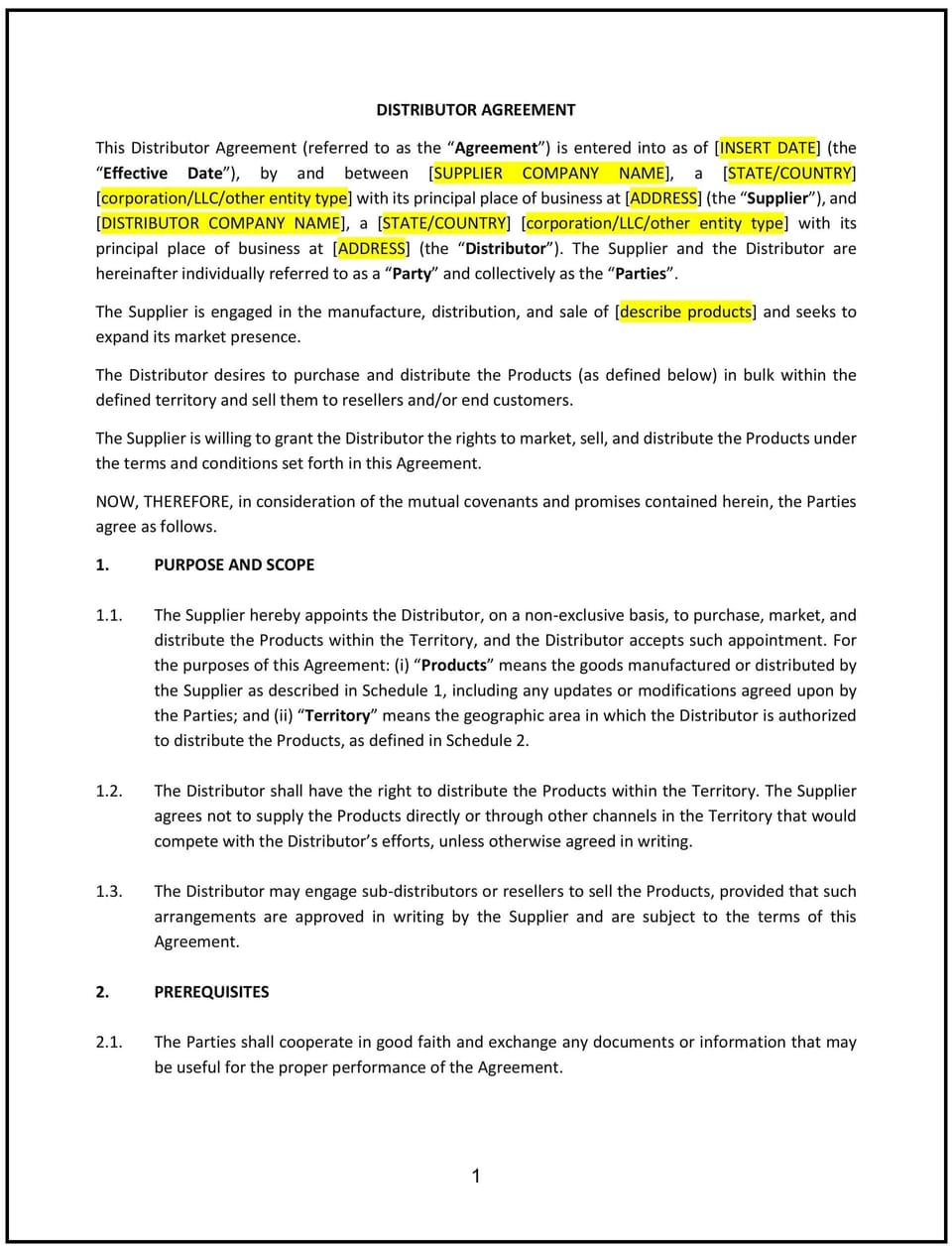Distributor Agreement (Montana): Free template

Distributor Agreement (Montana)
A Distributor Agreement is a contract between a supplier or manufacturer (the "Supplier") and a distributor (the "Distributor") that outlines the terms under which the Distributor can purchase and resell the Supplier’s products. In Montana, Distributor Agreements are commonly used in industries such as agriculture, manufacturing, food and beverage, consumer goods, and healthcare. Montana’s strong agricultural base, coupled with its growing manufacturing and tech sectors, makes it an ideal location for drafting and enforcing such agreements.
For example, a Missoula-based food processing company might use a Distributor Agreement to partner with a regional distributor, while a Great Falls-based tech startup might use it to expand its market reach. A well-drafted Distributor Agreement ensures clarity on pricing, territories, and responsibilities, fostering a successful partnership.
Tips for drafting and maintaining a Distributor Agreement in Montana
- Define the scope of distribution: Specify the geographic area where the Distributor is authorized to sell the Supplier’s products. Include exclusivity terms if applicable. Ensure compliance with Montana’s antitrust laws, which prohibit anti-competitive practices.
- Example: “The Distributor is granted exclusive rights to distribute the Supplier’s products within the state of Montana.”
- Outline product details: List the products covered by the agreement and any restrictions on sales channels or markets. If the products involve regulated substances (e.g., food, beverages, or pharmaceuticals), ensure compliance with Montana’s health and safety regulations.
- Example: “The Distributor is authorized to sell the Supplier’s products exclusively to retail outlets and may not sell online without prior approval.”
- Set pricing and payment terms: Detail the pricing structure, discounts, and payment terms. Include provisions for handling returns or defective products. Ensure transparency in pricing to comply with Montana’s consumer protection laws.
- Example: “The Distributor will purchase products at a 30% discount off the Manufacturer’s Suggested Retail Price (MSRP) and will pay invoices within 15 days.”
- Address marketing and promotion: Specify the Distributor’s obligations to promote the Supplier’s products and any co-marketing support provided by the Supplier. Ensure compliance with Montana’s advertising laws, which prohibit misleading or deceptive practices.
- Example: “The Distributor agrees to allocate $5,000 annually for marketing the Supplier’s products and will submit a marketing plan for approval.”
- Include performance metrics: Establish minimum purchase requirements or sales targets to ensure the Distributor actively promotes the Supplier’s products. Performance metrics should be realistic and measurable to avoid disputes.
- Example: “The Distributor agrees to purchase a minimum of $50,000 worth of products quarterly or risk termination of this agreement.”
- Specify termination clauses: Define the conditions under which the agreement can be terminated, such as breach of terms, failure to meet performance metrics, or mutual agreement. Include provisions for winding down the relationship, such as returning unsold inventory or ceasing use of intellectual property.
- Example: “Either party may terminate this agreement with 60 days’ written notice if the other party fails to fulfill its obligations.”
- Comply with Montana laws: Ensure the agreement adheres to Montana’s contract laws, including the Montana Uniform Commercial Code (UCC) for transactions involving goods. Address compliance with environmental regulations, labor laws, and consumer protection statutes.
- Include dispute resolution mechanisms: Specify how disputes will be resolved, whether through arbitration, mediation, or litigation. Montana courts often favor alternative dispute resolution methods, so consider including an arbitration clause.
- Example: “Any disputes arising under this agreement shall be resolved through arbitration in Billings, Montana.”
Frequently asked questions (FAQs)
Q: Is a Distributor Agreement legally binding in Montana?
A: Yes, as long as the agreement is clear, reasonable, and complies with Montana contract laws, it is enforceable. Including specific terms and signatures from both parties strengthens enforceability.
Q: What should a Distributor Agreement include in Montana?
A: It should include the scope of distribution, product details, pricing and payment terms, marketing obligations, performance metrics, termination clauses, compliance with Montana laws, and dispute resolution mechanisms.
Q: Can a Distributor Agreement be terminated early in Montana?
A: Yes, if the agreement includes a termination clause, either party can terminate the document with reasonable notice. The terms should specify any conditions or procedures for termination.
Q: What industries commonly use Distributor Agreements in Montana?
A: Industries like agriculture, manufacturing, food and beverage, consumer goods, and healthcare frequently use Distributor Agreements in Montana. For example, a beverage company might use it to expand its distribution network.
Q: How can businesses ensure compliance with Montana laws in Distributor Agreements?
A: Businesses should ensure their agreements comply with Montana’s contract laws, including the UCC, environmental regulations, and consumer protection statutes. Regularly reviewing and updating the agreement is also essential to maintain compliance.
This article contains general legal information and does not contain legal advice. Cobrief is not a law firm or a substitute for an attorney or law firm. The law is complex and changes often. For legal advice, please ask a lawyer.


